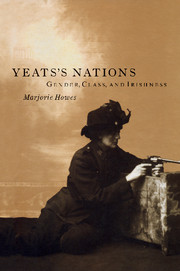Book contents
- Frontmatter
- Contents
- Acknowledgments
- List of abbreviations
- Introduction
- 1 That sweet insinuating feminine voice: hysterics, peasants, and the Celtic movement
- 2 Fair Erin as landlord: femininity and Anglo-Irish politics in The Countess Cathleen
- 3 When the mob becomes a people: nationalism and occult theatre
- 4 In the bedroom of the Big House: kindred, crisis, and Anglo-Irish nationality
- 5 Desiring women: feminine sexuality and Irish nationality in “A Woman Young and Old”
- 6 The rule of kindred: eugenics, Purgatory, and Yeats's race philosophy
- Notes
- Bibliography
- Index
3 - When the mob becomes a people: nationalism and occult theatre
Published online by Cambridge University Press: 06 July 2010
- Frontmatter
- Contents
- Acknowledgments
- List of abbreviations
- Introduction
- 1 That sweet insinuating feminine voice: hysterics, peasants, and the Celtic movement
- 2 Fair Erin as landlord: femininity and Anglo-Irish politics in The Countess Cathleen
- 3 When the mob becomes a people: nationalism and occult theatre
- 4 In the bedroom of the Big House: kindred, crisis, and Anglo-Irish nationality
- 5 Desiring women: feminine sexuality and Irish nationality in “A Woman Young and Old”
- 6 The rule of kindred: eugenics, Purgatory, and Yeats's race philosophy
- Notes
- Bibliography
- Index
Summary
A nation should be like an audience in some great theatre – “In the theatre,” said Victor Hugo, “the mob becomes a people”.
(VP, 836)Superstition is knowledge, because it sees together the ciphers of destruction scattered on the social surface; it is folly, because in all its death-wish it still clings to illusions: expecting from the transfigured shape of society misplaced in the skies an answer that only a study of real society can give.
Theodor Adorno, “Theses Against Occultism”Yeats was a nationalist who longed for community but hated crowds. In both versions of A Vision he described the men of Phase 17, his own phase, as men who dedicate themselves to work in the public sphere but hate precisely the things that make it public:
men of this phase are almost always partisans, propagandists and gregarious yet because of the Mask of simplification, which holds up before them the solitary life of hunters and of fishers and “the groves pale passion loves”, they hate parties, crowds, propaganda.
(V, 143)Yeats cites Shelley as his major example, but he was equally describing his own conflicted relationship to nationalist political work. Parties, crowds and propaganda are associated with a particular kind of politics that emerged as an increasingly important paradigm of politics in general during the nineteenth century: mass politics. Like the men of Phase 17, Yeats was both fascinated and repelled by crowds. Much of his ambivalence about popular Irish nationalism revolved around the fact that it involved crowds, that it was, inescapably, mass politics.
- Type
- Chapter
- Information
- Yeats's NationsGender, Class, and Irishness, pp. 66 - 101Publisher: Cambridge University PressPrint publication year: 1996



